The 9 BEST Acoustic Guitar Strings 2024 (For Brighter Tone)
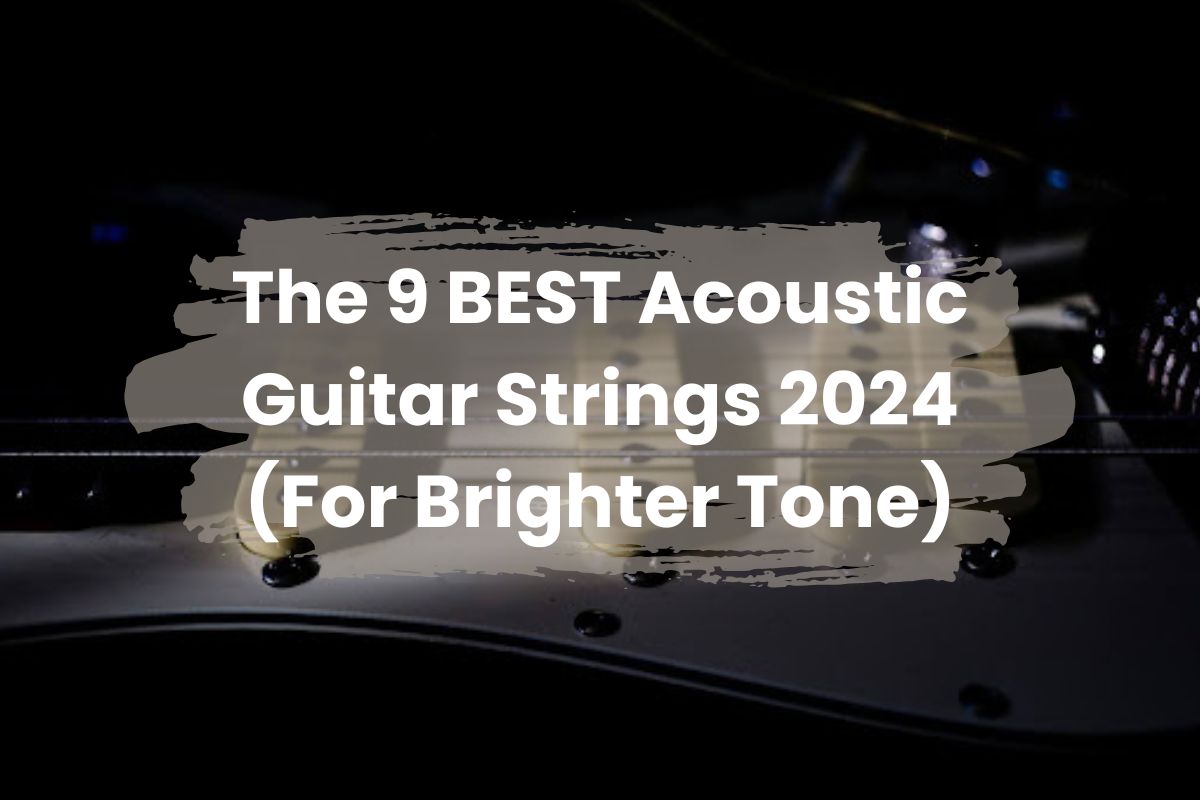
As you searched for guitar strings that produce “bright tones”, we guess you have very specific guitars.
We are taking a shot in saying perhaps you have a great connection to tone with crisp, fuller, bright, yet balanced. Or simply, you love how bright strings give that extra twist to your favorite folk or pop songs.
No matter the reason, you’ll definitely get a recommendation for “bright tone” guitar strings from the best today.
| Hey, if you are new and looking for guitar strings with a bright tone, we have a little something to talk to you about. → In folk music, if you have brighter-tone strings, they will help you bring out the melodic lines and intricate finger-picking patterns. → With country music, brighter strings add the “twangy” sound. This is more common in bluegrass and other subgenres of country music. → Lastly, are you into pop? Then, a brighter tone can make your guitar sound more modern and polished, adding “shine” to your modern pop production. |
Moving to our best acoustic guitar string suggestions for brighter tones, here are the nine best brands that have received a lot of appreciation for being the most reliable in terms of giving the exact tone for the music.
| Quick Glance At The 9 BEST Acoustic Guitar Strings 2024 (for Brighter Tone) | ||
| Brands | Price Ranges (3 Packs) | Best For |
| Zager Easy Play “No Sore Fingers” | 48$ | Beginners who want a string that won’t cause finger pain from practicing for a longer time. |
| Martin MA540 | 18$ | Players who prefer fingerpicking. |
| D’Addario EJ16 | 22$ | The player who prefers both fingerstyle and flatpicking. |
| Ernie Ball 2146 Earthwood | 18$ | Players who have no problem with a hint of warmness with the bright tone |
| Elixir 80/20 | 30$ to 50$ | Players who prioritize durability and long-lasting performance. |
| John Pearse 600L | 30$ to 40$ | Players who are looking for good bass, clean mids, and clear highs. |
| DR Rare RPM | 20$ to 30$ | Players who want strings with enhanced sustain and resonance. |
| Curt Mangan | 30$ to 40$ | The player who likes personalized strings. |
| Stringjoy Foxwoods | 53$ | Players who need a string that can hold an adequate level of pressure. |
For our “always-looking-for-innovative-features” guys, some good news was introduced in 2024 under ingenious modern guitar string manufacturing.
- Ernie Ball just released some new stainless steel Flatwound Guitar strings. They’re wrapped in cobalt-iron ribbon, which gives them a really bright and clear tone.
- And D’Addario has also dropped something new – their fresh NYXL electric guitar strings. They’re made with a NY Steel core, premium nickel-plated steel wrap wire, and Fusion Twist technology.
Pretty cool, right?
4 Factors to Consider When Choosing Acoustic Guitar Strings for a Brighter Tone
Factors you will need to put more thought about while buying guitar strings are these four:
- Material composition for guitar strings (Not every kind of material will sound brighter)
- String gauge (The thickness of the strings determines what tone you will get)
- Coated and uncosted string (The outer layer of the strings also has a part in guitar sound)
- String core shapes ( The internal shape of the strings shouldn’t be neglected as well while looking for brighter tones)
Material Composition
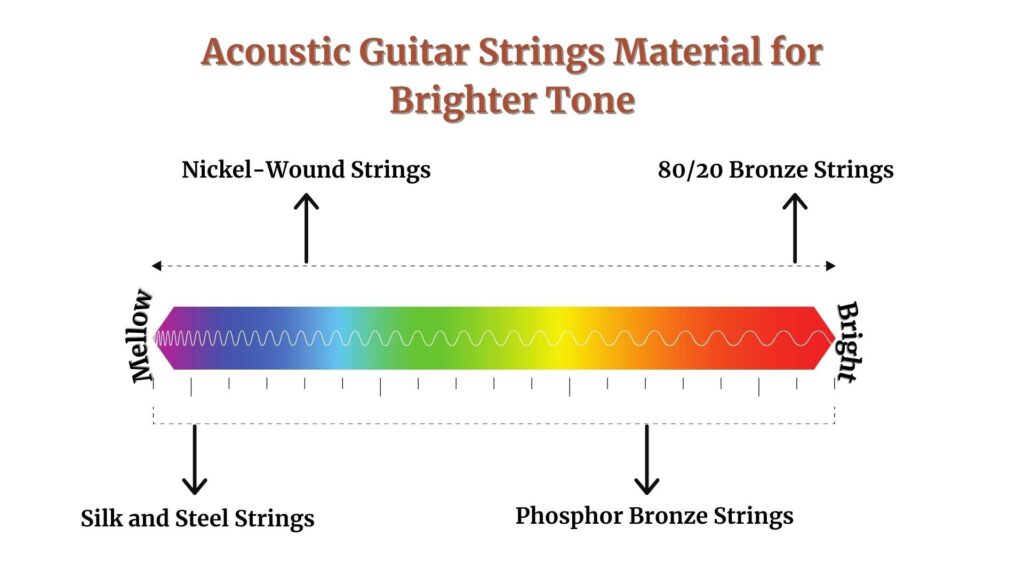
Whatever material your guitar strings are made of, there is always a reason to use that particular material composition. When it comes to acoustic guitar strings, the material you choose is essential, as some materials are inherently brighter than others.
- Phosphor Bronze: The balance of copper and phosphorus makes the material sound bright with a midrange tone when picking the strings. The higher the content, the brighter the sound.
- 80/20 Bronze: These strings combine 80% copper and 20% zinc. This composition produces a bright and crisp tone that highlights the treble frequencies.
Besides these two, silk & steel, and nickel-wound strings are the common string materials for acoustic guitars. Both of them are ideal for warmer tones. If you like a mellow sound, then go for these two.
But our main character is 80/20 Bronze guitar strings, which are the best for brighter tones!
String Gauge
The string gauge indicates the thickness of the strings; you can even call this string weight, as we do. It has a particular role in guitar tone and playability.
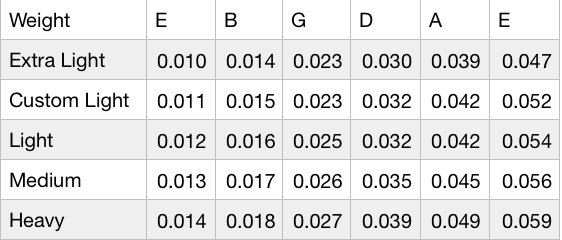
We lay out all string gauges for you to pick for your acoustic guitar to bring out the brightness. If you want to sound significantly brighter, then your string gauges will be light. So, the strings from the thinnest (1st) to the thickest (6th) under the light category on the chart above are your acoustic guitar string gauge options.
Coated vs. Uncoated Strings
Strings with or without coating can affect sound quality and longevity. If you’re looking for a brighter tone, both coated and uncoated strings have something to offer. Check out the details in the image below.
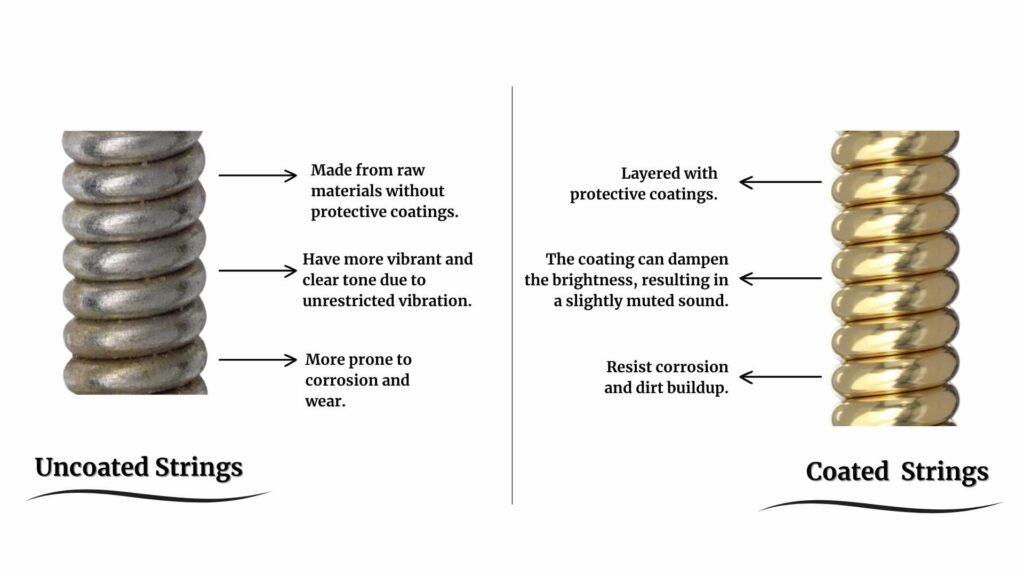
So, uncoated strings are the best ones for brighter tones. The only downside is that they will wear off much earlier than coated strings.
String Core Shape
Another factor is influencing strings to have different tonal qualities and playability. The internal shape of the string core comes in two shapes: Hex core and Round core. It looks something like this:
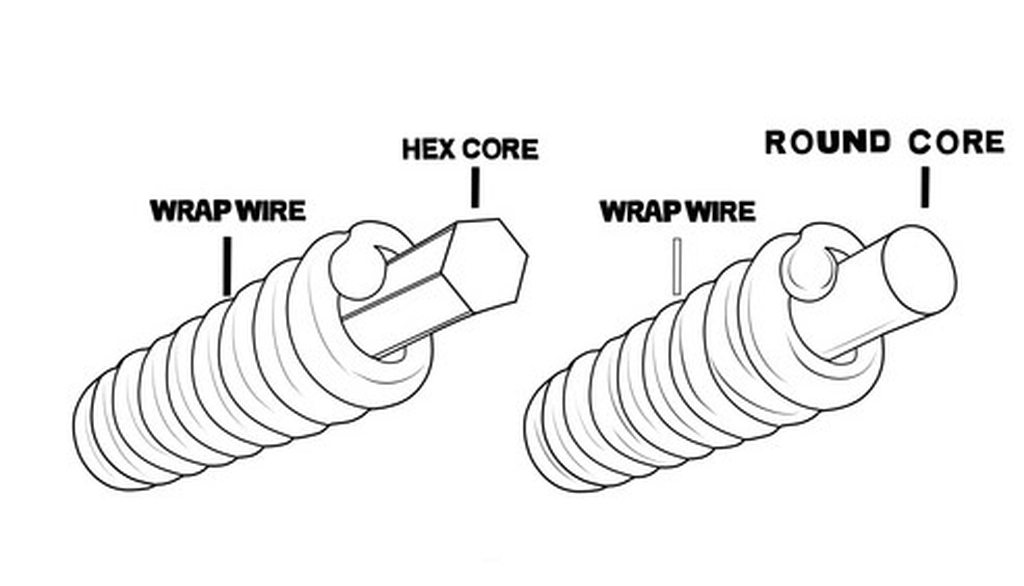
- Hex-Core Strings: These strings have a hexagonal core shape, which is said to provide more brightness and better control of vibration. The design is made for higher frequency by transferring energy from the core to the winding.
- Round-Core Strings: These are round-shaped and have more flexibility and a softer feel. They aren’t as bright as the Hex core and lack grip between the winding and core.
Therefore, it means that acoustic guitar strings for brighter tones should have a hex core shape.
The 9 BEST Acoustic Guitar Strings for Brighter Tone in 2024
1. Easy Play “No Sore Fingers” Guitar Strings
Zager Easy Play “No Sore Fingers” guitar strings are considered top-quality strings and have been reviewed by many players. 70 years of research have created what pros call the best guitar string on the market today
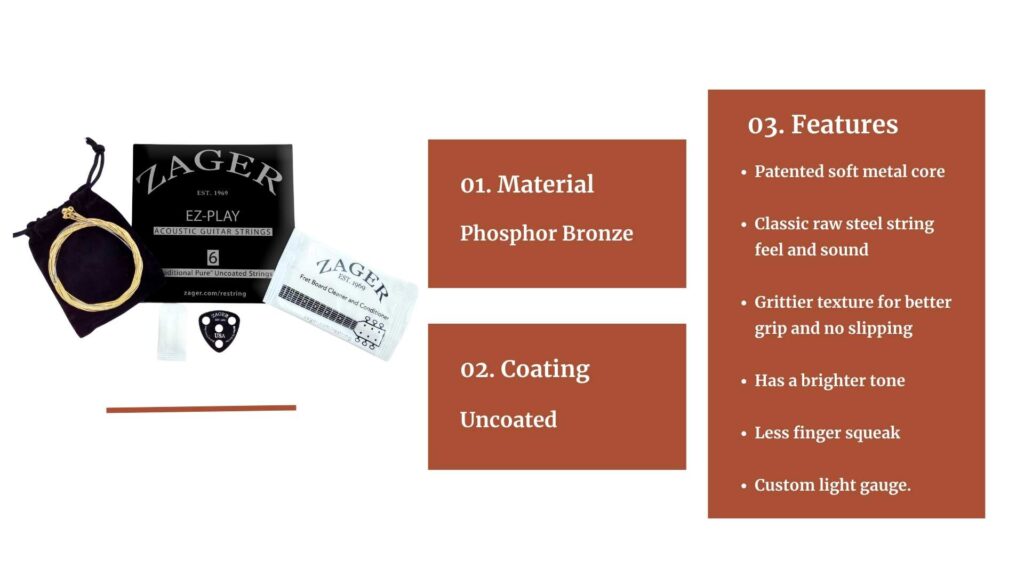
| Why Should You Buy | Why You Should Not Get |
| The very reason you are here for. Zager EZ play is the top choice if you want your acoustic guitar to sound bright and clear. Their EZ play checked all boxes to be a suitable fit for a bright tone. Other than that, you are getting your hand on long-lasting and fatigue-free strings. | Some might feel that the uncoated strings are slightly different from the coated ones and want to stick with coated guitar strings. |
Best For:
- Players who desire a bright and clear tone.
- Players who wish to have strings that are easy on the fingers.
- Players who want durable strings for the long run.
2. Martin MA540 Phosphor Bronze
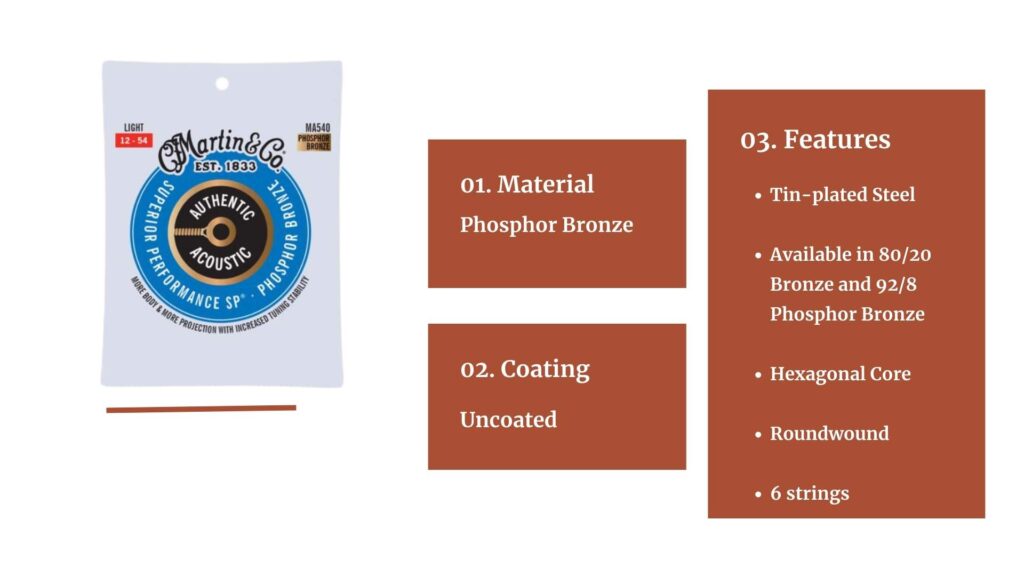
| Why Should You Buy | Why You Should Not Get |
| They should be your go-to option if you are into bluegrass and country music. They have a perfect amount of bass and a brighter sound in them. It will also add the twang in country songs. | These strings might not be suitable for heavy strumming. Using an extra light gauge will not give you enough tension for your aggressive strumming styles. |
Best For:
- Players who prefer fingerpicking.
- Players who are into pop and country and use those music patterns.
3. D’Addario EJ16 Phosphor Bronze Strings
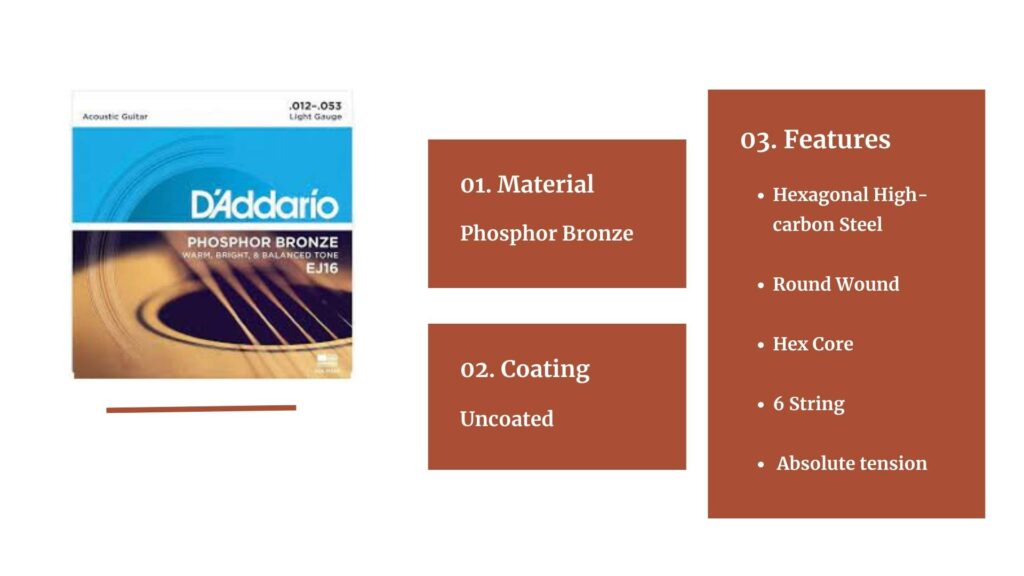
| Why Should You Buy | Why You Should Not Get |
| These strings work great for both fingerstyle and flatpicking. They’ll really shine in your folk and rock performances. | Beginners should avoid buying them as the Phosphor Bronze strings may feel slightly harsh on the fingers. |
Best For:
- Players who spend a lot of time on the fretboard love using these as they do not need to be changed that frequently.
4. Ernie Ball 2146 Earthwood Phosphor Bronze Acoustic Guitar Strings
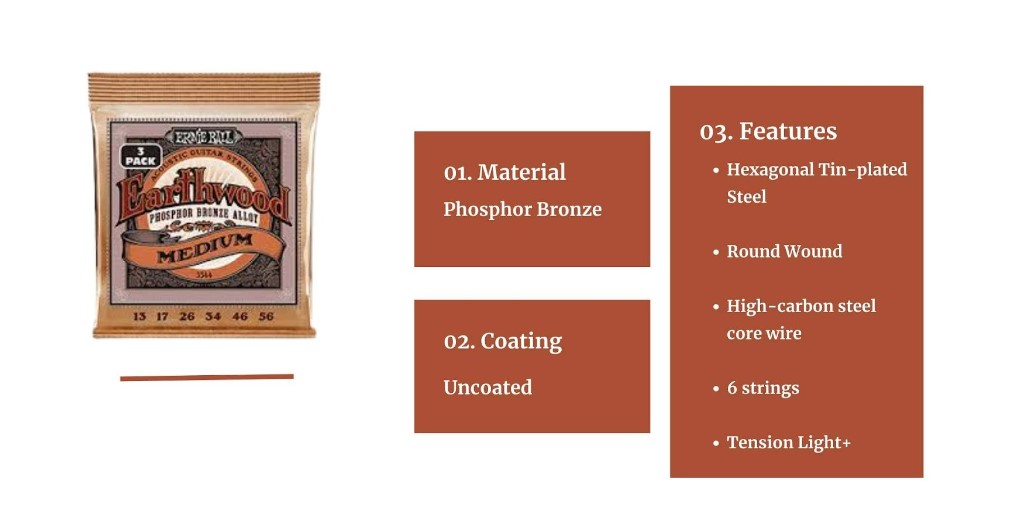
| Why Should You Buy | Why You Should Not Get |
| If you’re into deep, full-bodied sounds with a hint of sparkling high notes, these strings are perfect for you. Plus, they’re easy on your fingers, so you won’t have to worry about getting tired. | They may not be the absolute brightest strings on the market as acoustic guitar strings. But their electric guitar strings can be on your buying list. |
Best For:
- Players who have no problem with a hint of warmness with the bright tone.
- Those who prefer a smooth feel and long-lasting performance.
5. Elixir 80/20 Bronze Acoustic Guitar Strings, NANOWEB Coating
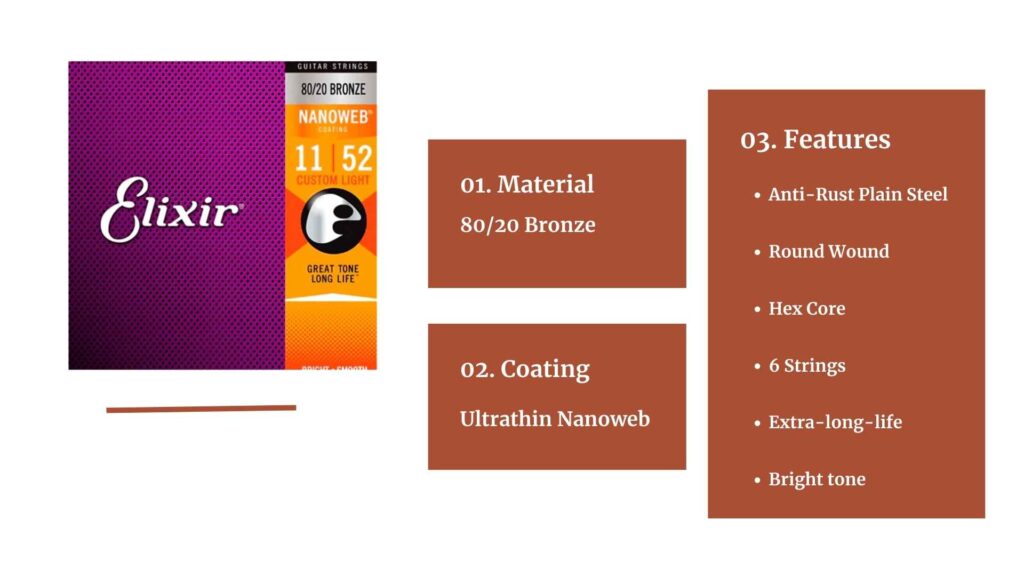
| Why Should You Buy | Why You Should Not Get |
| You should buy them if you have tried replacing your strings without adequately using them. Besides, if you are looking for both strumming and fingerpicking styles, thanks to their balanced tone and durability. | The only reason you won’t think of buying them is if you have a tight budget for strings. |
Best For:
- Players who prioritize durability and long-lasting performance.
6. John Pearse 600L Phosphor Bronze Acoustic Guitar Strings
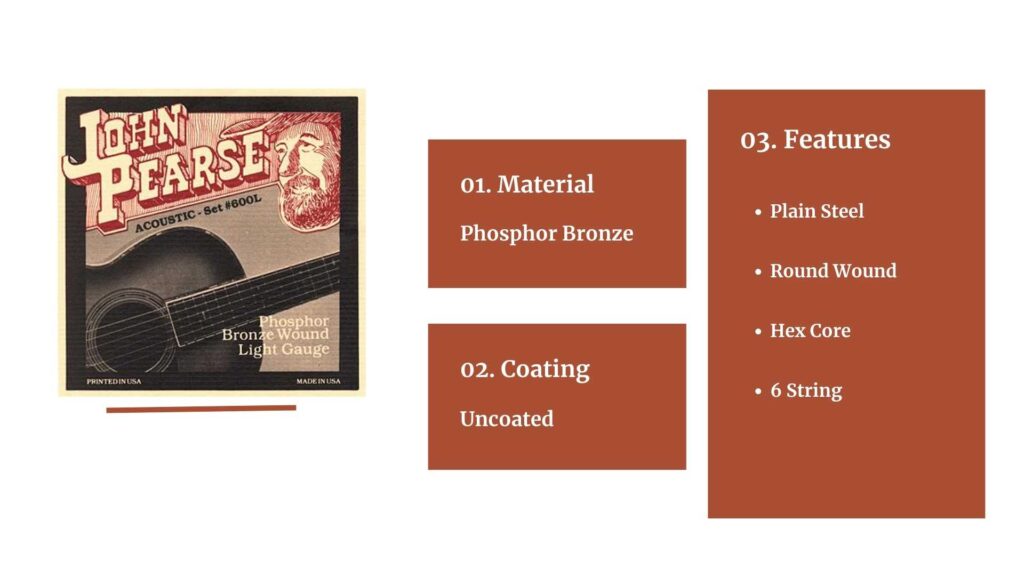
| Why Should You Buy | Why You Should Not Get |
| These strings come at a reasonable price, and they have good bass, clean mids, and clear highs. You can easily fit them in for a variety of musical genres. | Although they may not be the absolute brightest strings on the market, they are still good choices due to their clear and clean tone. |
Best For:
- Players are looking for a reliable and affordable string set.
7. DR Rare RPM Acoustic Guitar Strings
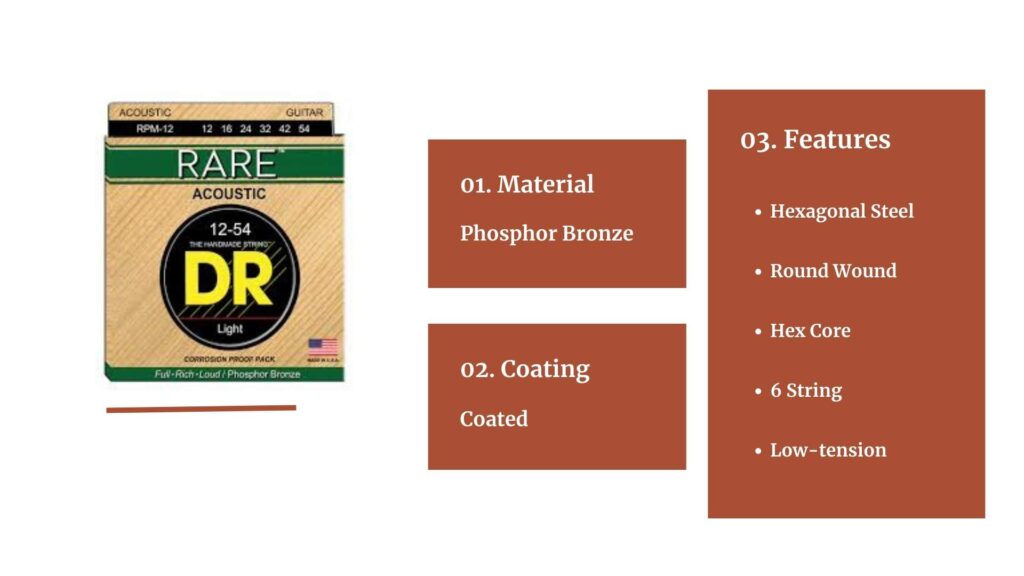
| Why Should You Buy | Why You Should Not Get |
| For your heavy playing session, these strings will withstand for extended periods. They even minimize the wear on your fret. | These strings may not be the choice for players who prefer a slightly different tone or gauge for their specific playing style. |
Best For:
- Players who want strings with enhanced sustain and resonance.
8. Curt Mangan Guitar Strings
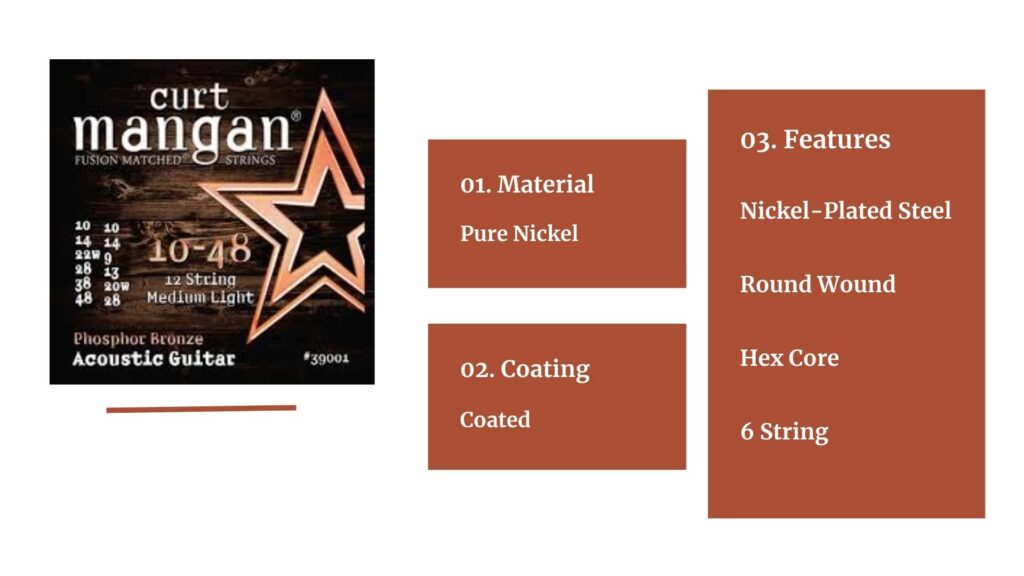
| Why Should You Buy | Why You Should Not Get |
| You have the option to create your own custom gauge. Your strings are personalized with your name, and you can choose between coated strings for longer life or vintage-tone pure-nickel sets. | You will have to spend a bit too much than other strings. So, if you are on a budget, you might pass on them. |
Best For:
- Players who want to customize their strings to their exact specifications.
9. Stringjoy Foxwoods Coated Phosphor Bronze Acoustic Guitar Strings
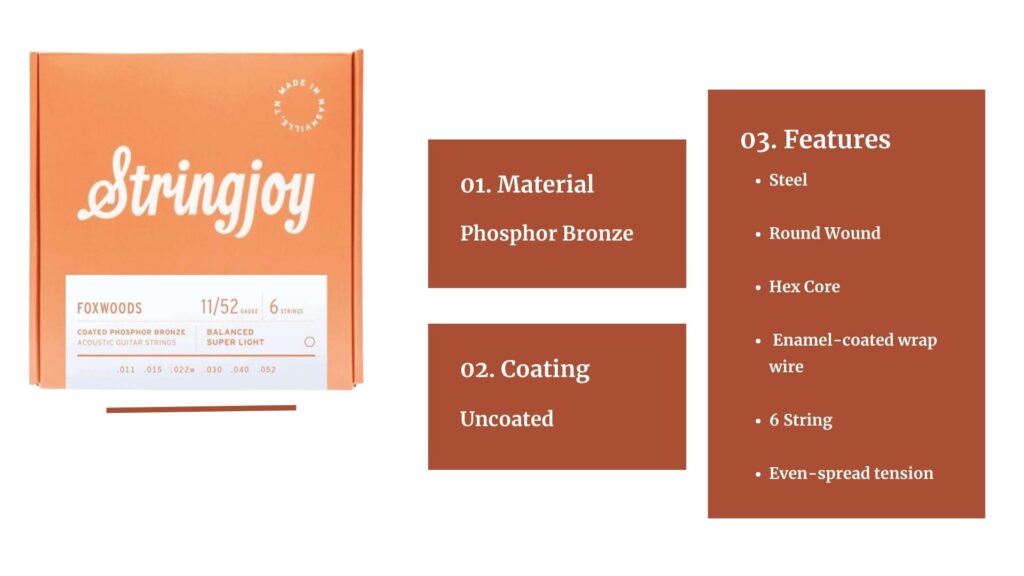
| Why Should You Buy | Why You Should Not Get |
| They have the lightest strings and will allow you to put as much pressure on the strings as you want. Their coating is all for durability and a smooth feel. | The reason is they are expensive and can’t match your lower budget. |
Best For:
- Players who want a bright, balanced tone with good durability.
Types of Acoustic Guitar Strings
At this time, many acoustic guitar strings are available in the market. Each one is made out of acoustic-friendly material. They have a bunch of different tones, so you can get a brighter or warmer sound, as well as a softer feel, longer lifespan, and a variety of tension choices.
Here, we present some of the popular options among guitarists.
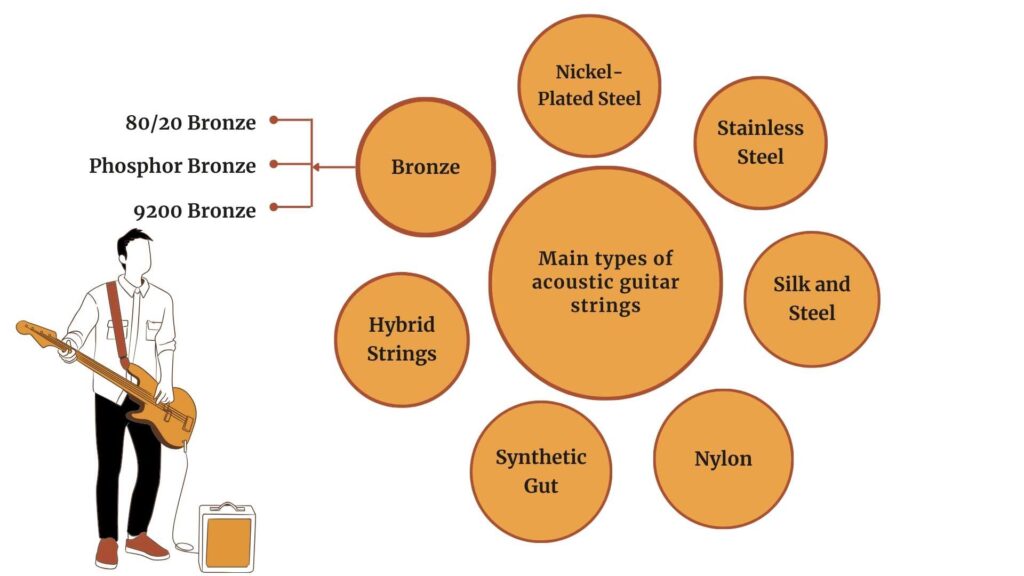
The 9 best acoustic guitar Strings 2024 price
We don’t want you to roam around vaguely searching each brand for prices. That’s why we have collected the prices of these nine best acoustic strings. These are the possible ranges. The price may fluctuate a bit, but not too much.
| Top Brands | Price (3 Pack) |
| Zager Easy Play “No Sore Fingers” | 48$ |
| Martin MA540 | 18$ |
| D’Addario EJ16 | 22$ |
| Ernie Ball 2146 Earthwood | 18$ |
| Elixir 80/20 | 30$ to 50$ |
| John Pearse 600L | 30$ to 40$ |
| DR Rare RPM | 20$ to 30$ |
| Curt Mangan | 30$ to 40$ |
| Stringjoy Foxwoods | 53$ |
* *We’ve got price ranges without giving the exact prices because different websites have different prices. Also, the prices here can change depending on where you are and where you’re buying from.
Which Acoustic Strings Are Best For Beginners?
As we have started our journey to find the best acoustic guitar strings, we have nine of them, and each one stands out as the best. However, what got us thinking is that not every one of them is perfect for beginners.
We want to provide beginners with something reliable, as they often struggle with finger pain from the strings. That is why beginners who love brighter tones can purchase EZ-Play PillowTouch Uncoated Strings.
What you will get:
- It will feel soft while strumming
- No finger fatigue even playing for a longer time
- Much easier to learn on any guitar
- It can be held with a good grip without slipping
- Lighter gauge will prevent soreness in early practices
- Appreciation from the National Arthritis Foundation and the National Multiple Sclerosis Society will encourage you to rely on them.
We have attached feedback from our customers, which they shared on different websites.




Reddit Threads
Let’s see what customers say about these nine best acoustic guitar strings. Are they legitimate and trustworthy?







These are just some of the feedback collected from Reddit. You can search for more by yourself. But all nine acoustic guitar strings are good to go.
How to Choose the Right Acoustic Guitar Strings for You?
It’s not too late to talk about picking out the right strings for your acoustic guitar. Choosing the right strings can make a difference in how you play, so it’s good to know all the factors before buying.
Things you can follow to buy the right acoustic guitar strings for you are:
Consider Your Playing Style
- For the fingerpicking players, go for lighter gauge strings (like extra light or light) to enjoy the delicate nuances.
- Strumming players should buy heavier gauge strings (like medium or heavy) for more volume.
Consider the Guitar’s Body Size and Tonewood
- Small-shaped guitar bodies are perfect for stringing extra lighter or light gauges to avoid overpowering the instrument’s natural tone.
- Bulky acoustic guitars can easily carry the heavier gauge strings for increased volume and sustain.
- Tonewood influences guitar sound, so choose a guitar constructed from spruce or mahogany. Spruce guitars are appreciated for their brightness and can easily be paired with lighter gauge strings. Mahogany offers a milder and mellow tone.
Experimenting with Different String Gauges and Materials
- Try different gauges (extra-light, light, light-medium, medium, heavy) to find which sound attracts you more.
- Experiment with different materials, such as phosphor bronze, 80/20 bronze, nickel-plated steel, and stainless steel, to get a clear idea of your tone preferences.
- Look into both the coated and uncoated strings to understand what kind of difference they will bring.
How to Maintain Acoustic Guitar Strings for Optimal Brightness?
Never forget to maintain the strings. We don’t want your guitar strings to lose their shelf life just because they weren’t handled carefully. Here are a few basic steps you can follow to keep the brighter tone at peak.
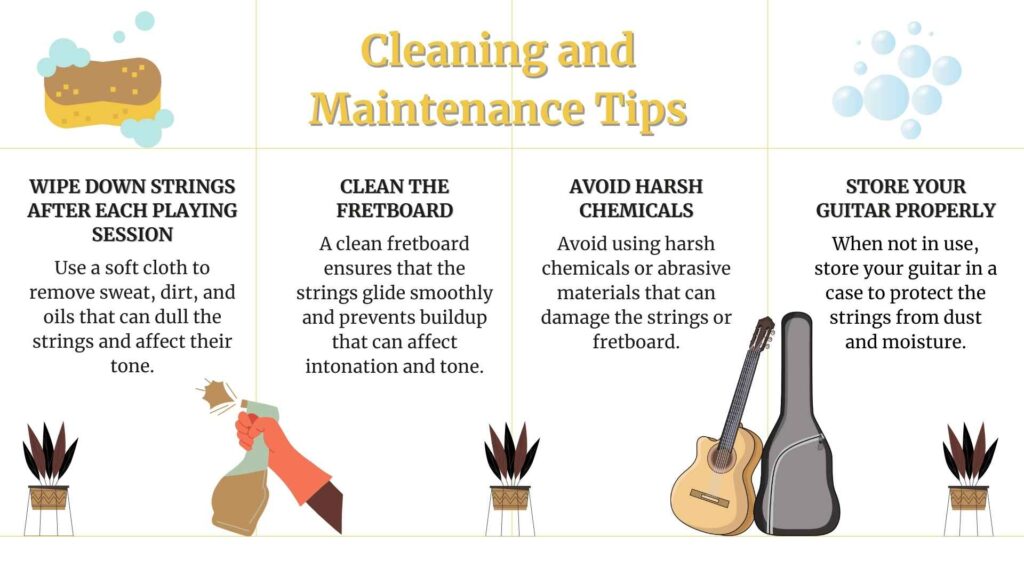
How Often Should You Change Acoustic Guitar Strings?
No one puts fingers on how often one should change their acoustic guitar strings. It depends on you, including your playing style, the environment, and the type of strings you use. However, as a general guideline, you should consider changing your strings:
- Every 2 to 3 weeks if you play the guitar every 5 to 7 hours.
- Every 4 to 6 weeks, if played, only 1/2 hours.
- Your strings may last longer playing infrequently or in a dry climate.
Frequently Asked Questions
Strings made of 80/20 bronze uncoated and light gauge are significantly the brightest. This is because they are made from 80% copper and 20% zinc, which produces a brighter tone.
String gauges have a prominent effect on bending and vibration. When you use lighter strings, the frequency is higher, which means bright sound. Conversely, heavier gauges are for fuller sound.
The life span of acoustic guitar strings depends on multiple factors. However, most bright strings will last for a few weeks to months.
Uncoated strings are brighter than coated ones. Since coated strings have a layer outside, it dampens the strings’ vibration and makes them sound warm and mellow.
Electric guitar strings are a good fit for an acoustic guitar because they have lighter gauges.
1. Buy a pair of string cutters and a new set of strings
2. Cut the old strings and loosen them
3. Remove them from the tuners
4. Insert the new strings
5. Tune your guitar to the correct pitch after you have installed the new strings.
Medium gauge strings work best with strumming patterns. They are thick enough to produce a full sound but not so thick that they are difficult to play.
You will find many brands that offer good-quality guitar strings. It will be your call to decide which one matches your preference. We believe Zager EZ, D’Addario, Martin, and Elixir are good choices.
It is up to you. If you like a warmer tone, the coated strings will do fine, but if you prefer a brighter tone, choose uncoated 80/20 bronze strings.
Coated strings last longer than uncoated ones. This is because coated strings protect them from corrosion and wear and tear.
They are light gauge and made of Phosphorous bronze. These materials are the best acoustic guitar strings for fingerpicking. They are made from light gauge and phosphorus bronze. These materials go easy on the finger.
